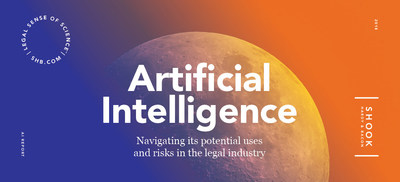TMCnet News
Can Robots Be Sued?WASHINGTON, Aug. 8, 2018 /PRNewswire/ -- It's a brave new world for lawyers navigating the potential uses and risks of artificial intelligence. The "Brave New World" is of course a nod to the 1930s dystopian novel set in a futuristic world. Today, scientific developments are unfolding in a positive way in real time, making life easier through the use of devices on our phones and in our homes. For consumers and businesses, the future is unfolding. For attorneys, the lack of legal precedent can represent both a challenge and an opportunity.
Shook, Hardy & Bacon's AI Task Force sheds some light on this changing landscape in a new white paper co-authored with ALM Media. Unlike other reports focusing on the impact of legal AI applications, Shook's report is based on a survey of in-house counsel navigating industries directly affected by consumer-facing artificial intelligence applications, including the automotive, life science and manufacturing sectors. "As the business needs of a company push for greater efficiency and effectiveness resulting from implementatio of artificial intelligence, the in-house counsel role will need to grow," stated Shook Intellectual Property & AI Partner Cory Fisher. "Not only to understand the underlying technology, but also the new avenues of potential liability from supplanting traditional actors with AI." Shook's AI Task Force takes a unique approach to helping companies anticipate and resolve liability challenges related to AI application. Unlike a traditional law firm practice group, the task force strategically aligns attorneys across a variety of disciplines, including intellectual property, privacy and data security, product liability, class action litigation, and public policy. The survey found that 58 percent of respondents said their company plans to expand its use of AI in the near term. Other findings in the general counsel survey revealed their top concerns:
Fisher and his colleague Shook Public Policy Partner Cary Silverman speak and write frequently on the legal ramifications of artificial intelligence and its impact on business and general counsel. Fisher and Silverman are available to speak to the media about the findings of this survey and brief white paper which was conducted in collaboration with ALM Media. To obtain a copy of the white paper, contact [email protected] or visit www.shb.com About Shook, Hardy & Bacon Founded in 1889, Shook, Hardy & Bacon L.L.P. has 12 offices in the United States and London, with attorneys and professional staff serving clients in the health, science and technology sectors in areas ranging from product liability defense and commercial litigation to intellectual property prosecution and litigation, environmental and toxic tort, privacy and data security, and regulatory counseling.
SOURCE Shook, Hardy & Bacon L.L.P. 
|

